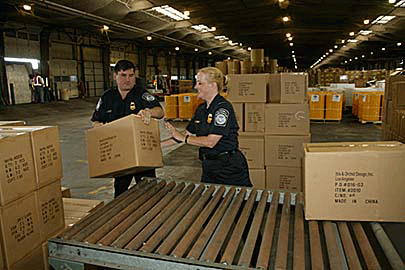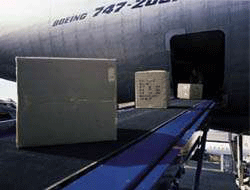

 |
 |
|
| |
||
U.S. Passes Air Cargo Security Bill As
lawmakers in Washington, D.C. early yesterday evening passed broad new
anti-terrorism legislation including strict new rules concerning air cargo
shipped in bellies of passenger aircraft, air cargo voiced concern of
potential negative impact on commerce. As
lawmakers in Washington, D.C. early yesterday evening passed broad new
anti-terrorism legislation including strict new rules concerning air cargo
shipped in bellies of passenger aircraft, air cargo voiced concern of
potential negative impact on commerce. Some experts believe that these cargo restrictions once enacted could impact the efforts of U.S. flags, finally making money again by utilizing cargo-capable, long haul aircraft to build their bottom lines, as the boom in business brought on by route expansion overseas continues to take hold. Others are pointed in their dismissal of the move as political posturing. “To deter terrorists from exploiting international trade, the U.S. currently relies on counterterrorism and intelligence programs combined with risk assessments, random checks,  and
the inspection of suspicious high-risk cargo,” said James Jay Carafano,
(right) a senior fellow at the Heritage Foundation. and
the inspection of suspicious high-risk cargo,” said James Jay Carafano,
(right) a senior fellow at the Heritage Foundation. “The House bill replaces that system with one that mandates ‘strip searching’ every package and container coming from overseas.” Calling the Democrat lead measure a “feel good” attempt, Carafano said that passage of the bill means the private sector and foreign countries will be forced to spend billions of dollars on these inspections even though they would likely be no more effective than current programs. “In fact,” he said, “the new rules could be much more easily circumvented by terrorists.” Carafano argues that by diverting energy and resources into mass screening, Americans will also feel less safe.  Bruce
Schneier is an internationally renowned security technologist and author
who maintains that existing safeguards are insufficient, however; Bruce
Schneier is an internationally renowned security technologist and author
who maintains that existing safeguards are insufficient, however;“Unless a package from a ‘known shipper’ arouses suspicion or is subject to a random search it is taken on trust that its contents are safe,” he says. Captain Gary Boettcher, president of the U.S. Coalition Of Airline Pilots Associations, agrees, noting that the known shipper system “is probably the weakest part of the cargo security today.” “There are approximately 1.5 million known shippers in the U.S. “There are thousands of freight forwarders. “Anywhere down the line packages can be intercepted at these organizations,” he said. Those taking positions against a wholesale “security overhaul” point out that The September 11 Commission stated in its last report that any new measures should be carefully balanced. The report added that protecting planes against shoulder-fired missiles was just as vital as cargo inspection, and that threat of an explosive onboard could be mitigated by having “bomb-resistant” containers.
Indeed, Homeland Security Department officials stated that there is no “proven” technology for such comprehensive cargo screening.  According
to Russ Knocke, a Homeland Security Department spokesman, the screening
for air cargo is estimated to cost $3.6 billion over the next ten years. According
to Russ Knocke, a Homeland Security Department spokesman, the screening
for air cargo is estimated to cost $3.6 billion over the next ten years.As presently crafted, the bill requires that within three years, all cargo on passenger jet aircraft be inspected for explosives, as checked baggage is now. Currently, about 30 percent of air cargo on passenger planes is inspected by dogs or screening devices. The International Air Transport Association, meanwhile, continues to champion “globally harmonized” security measures. Such a policy, IATA says, will provide a high level of security “while also ensuring the efficient movement of air cargo that is so vital to the global economy.” To facilitate this effort, IATA has developed industry “best practices” and quality assurance systems as reflected in its Cargo Services Conference. Just as U.S. lawmakers are tightening the screws on belly cargo, analysts are predicting a huge surge in global services – particularly in Asia. But politics is driving this activity as much as anything else, with a newly empowered Democrat majority in U.S. Congress feeling the need to show an American public sick of the Iraq War, the U.S. President and the status quo out of Washington, that their mandate to deliver new leadership for change is being met. Patrick Burnson |